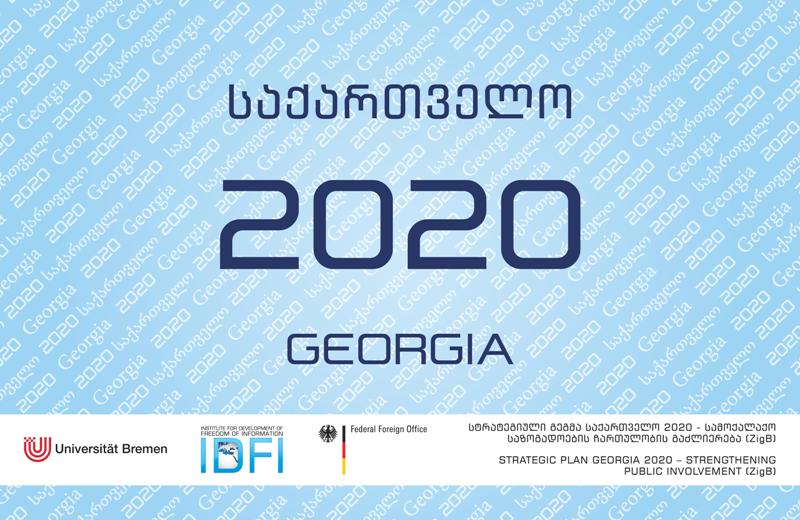


 In accordance to the June 17, 2014 resolution (N400) of the Government of Georgia, the Social Economic Development Strategy “Georgia 2020” was approved. The Ministry of Finance of Georgia was involved in the formulation of the strategy along with the Ministry of Economy and Sustainable Development of Georgia. IDFI was interested in the implementation process of the strategy. Therefore, the organization addressed the Ministry of Finance with questions.
In accordance to the June 17, 2014 resolution (N400) of the Government of Georgia, the Social Economic Development Strategy “Georgia 2020” was approved. The Ministry of Finance of Georgia was involved in the formulation of the strategy along with the Ministry of Economy and Sustainable Development of Georgia. IDFI was interested in the implementation process of the strategy. Therefore, the organization addressed the Ministry of Finance with questions.
1. In the face of current economic challenges, how does the ministry see the prospects of achieving the goals set out in the strategic document “Georgia 2020”?
The goals set out in the strategic document “Georgia 2020” remains to be the priority for the Government of Georgia and the gradual implementation of these objectives continues through specific reforms. Due to the slowdown of economic growth, which is the result of external factors, individual indicators might need to be adjusted. In order to implement relevant changes in the indicators’ part, a working group was created based on the June 25, 2015 Directive №1355 of the Government of Georgia.
2. Considering that the macroeconomic stability of the country is at risk, do you see the need to make a choice between implementation of policies, necessary for maintaining macroeconomic stability, and achieving the social-economic objectives of the government? In such case, what do you think should be the priority of the government, and how would that choice affect the implementation process of the strategic document “Georgia 2020”?
The macroeconomic stability of the country is not at risk; therefore, the Government of Georgia does not face that choice. However, the strategic document “Georgia 2020” clearly states the government’s policy in case of macroeconomic instability: “The stable macroeconomic policy is a necessary precondition for fast and healthy economic growth. If the Government is ever faced with a choice between implementation of Government’s other social or economic goals and carrying out the declared policies directed at macroeconomic stability, the priority will be given to the latter option.” (Georgia 2020, pg. 12)
3. To what extent will the budget adjustment in 2015 affect the implementation process of the objectives set out in the strategic document? Will the government maintain the increased costs of health and social insurance programs in the 2016 budget?
Adjustments carried out in the budget of 2015 have not affected the social obligations taken by the government and the costs have not been reduced in this direction. The social direction is one of the priorities for the ruling party and the government spends more than 9% of the GDP in this direction from the state budget alone.
The universal healthcare program was gradually implemented since 2013 and currently covers every citizen, not participating in private insurance schemes.
The budget of 2016 will consider all the costs needed to cover the social obligations taken by the government, including the universal healthcare program.
4. In addition to economic challenges, are there any other (political, social) obstacles that might hinder the implementation process of “Georgia 2020” objectives?
There are no political and social factors hindering the implementation process of “Georgia 2020” objectives.
5. Which of the three objectives (Private Sector Competitiveness, Human Capital Development, Access to Finance) set out in the strategic document do you consider to be the priority?
Each objective is equally important for the economic growth. There is no reason for choosing one specific objective.
6. During the revision process, to what extent does the Ministry of Finance check the compatibility of the budgets presented by different governmental entities with the priorities of the strategic document “Georgia 2020”?
The bill on annual budget is in itself a part of the Public Administration and Public Sector Financial Management system. It is formulated in accordance with the document on main findings and directions of the country, which determines the mid-term fiscal framework. The document is based on the government’s program and is derived from the sectoral strategic obligations.
Spending institutions determine the policy within their scope of competence in accordance with sectoral strategies and action plans. As for the formulation, revision and approval of the annual budget, the participating actors are determined by the legislation, while the compliance of the budget with the government strategy is ensured by the public finance management system and the Government of Georgia.